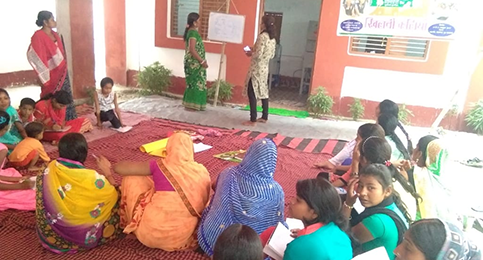
Poor menstrual hygiene and non-use of sanitary pads is a major health hazard for girls and women, especially in rural and poor households, not only in Bihar, Jharkhand or West Bengal, but in many other parts of India. Due to poverty, un-affordability, lack of awareness, behavioural issues and various other factors, use of unhygienic products by poor, disadvantaged, low caste or tribal women and girls in rural India, especially in eastern Indian states, is a major public health risk and challenge. Use of dirty cloths, waste cloths and paper, rugs and other coarse materials and repeated use of such items (without proper washing) are common. Use of unthinkable and even horrific substances like ash, clay and dust has also been reported from very marginalized and poorest of the poor communities.
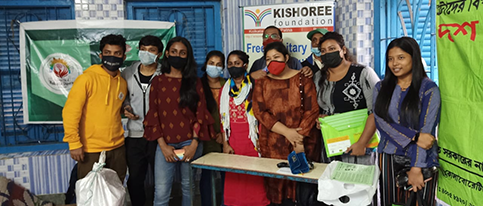
A large number of poor women and girls do not use sanitary pad during their menstrual period due to cost reasons as well as due to ignorance and indifference. There are various estimates available for the extent of such practices in India, which estimates that anywhere from 40 to 80 percent of women and girls in reproductive age do not use sanitary pad during menstruation cycles. What is important for Kishoree Foundation is the fact that in poor and underdeveloped state like Bihar and Jharkhand, this proportion certainly is on the higher side, and any effort towards making even a small improvement in the situation is very much required.
Sanitary pads available in the market are often unaffordable to poor women and girls (It costs anywhere between Rs.5 to Rs.10 per pad). Local sanitary pad manufacturing and distribution has been getting a wide attention in past couple of years, thanks to the efforts of many entrepreneurs who have been working towards manufacturing locally installable and usable sanitary pads making machine (units). As of now, there appears to be many options available in terms of setting up a small-scale sanitary pad manufacturing units and choice of technology and processes, from an almost manual four-stage processes to semi-automatic machines, and extending up to even Chinese machines. Further, many entrepreneurs and NGOs have come up with different types of machines and technologies. There are now even machines and processes which use environment friendly and bio-degradable materials. However, in these cases, the cost is generally much higher. Generally, the lowest-cost pads are those that are often called pads without wings. It is a rectangular pad, consisting of compressed wood pulp as the absorbent, packed and sealed in shape using some type of non-woven cloth. These are often not much popular with the users, especially the girls. The demand for winged pads and that too of good quality by even poor girls is something which has been experienced by the foundation while working in the villages.
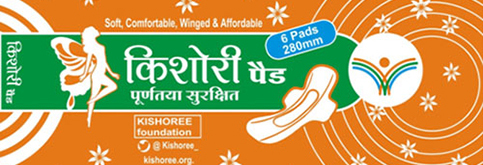
At Kishoree Foundation, we have tired to address the issue of Menstrual hygiene, non-use of sanitary napkins by rural and poor girls and women through a multi-pronged approach. The strategy has been to set up small scale village-based manufacturing unit and adopt a technology which can produce good quality winged sanitary pads. Another novel motivating factor was to use a technology which involves women in manufacturing process, so that they not only get a productive employment near their home, but also learn and understand the importance and nuances of menstrual hygiene and use of sanitary napkins.
(Front design of the Packet)
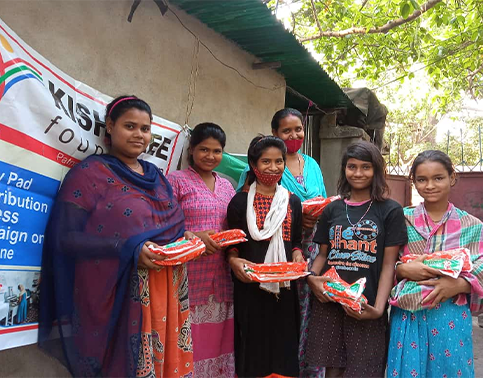
Thus, our novel and unique approach has been to engage local rural women productively in manufacturing and distribution process itself thereby integrating these activities with raising of awareness among women about the importance of menstrual hygiene and health and tackling the social-behavioural challenge. Our manufacturing units, which employ only women and girls, provide them not only an opportunity of earning, livelihood and empowerment, but in the process also exposes them to the processes and intricacies of sanitary pad making, its use and the applied knowledge and understanding of menstrual hygiene and women health. This process is further augmented and aided by an open and learning environment, friendly discussion and regular workshops with female experts. This all has a positive impact on tackling the often vexed and complex issue of socio-behavioural change related to use and utility of sanitary napkins. Thus, the objective has been to produce quality sanitary pads involving rural women. Although this approach has not made the foundation a low-cost manufacturer, it has many other benefits. The foundation also believes that despite the cost issue, this sanitary pad manufacturing and livelihood generation model can also be self-sustaining in the long run.
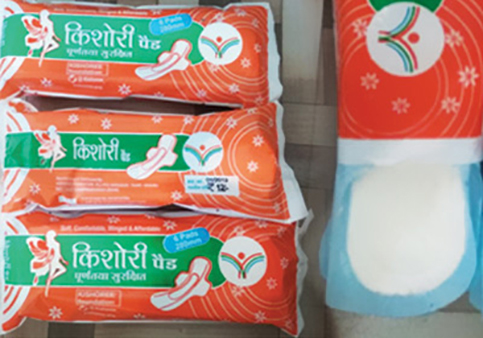
With a strategy towards these multi-pronged approaches, the Foundation has set up winged sanitary pad making units and is generating employment for women, and is distributing these pads with the involvement of volunteers, other NGOs, rural women, community workers and self-help groups and through awareness camps. The winged pads have been branded as ‘Kishoree Pad’ (meaning pad for adolescent girls). A large proportion of these pads are distributed free to the needly women and girls, and are also used during our menstrual awareness camp and workshop programs. Further, these are also being offered at cost price to women and girls who can afford them and are willing to do so. The foundation has also been collaborating with other charitable organizations and has supplied them Kishoree pads which was distributed by these organizations.
Foundation plans to continue with the eclectic strategy of having a distribution system which involved both, free and cost-recouping models. The operational model thus is also depended on the extent of funding the Foundation is able to arrange for free distribution of Kishoree pads through its various programs, workshops and camps.
Kishoree Foundation © 2019, All Rights Reserved.